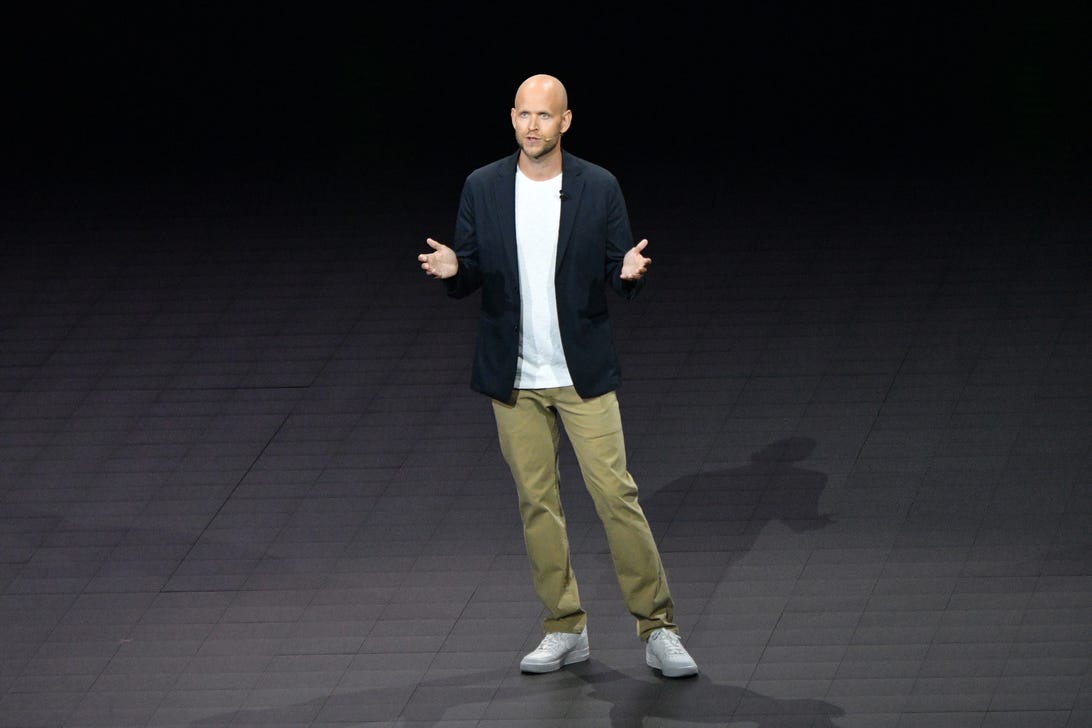
Spotify CEO Daniel Ek in August 2018 at a Samsung Unpacked event.
Mike Coppola/Getty Images for SamsungSpotify CEO Daniel Ek on Sunday spoke out publicly about the controversy that’s blown up over the Joe Rogan podcast and COVID-19 vaccine misinformation, sparked by an ultimatum from famed rocker Neil Young.
Ek noted in a blog post that doctors and scientists as well as Spotify subscribers have raised questions about the company’s policies and “the lines we have drawn between what is acceptable and what is not.” He also acknowledged that Spotify hasn’t been transparent about its policies regarding content that it hosts.
“It’s become clear to me,” Ek wrote, “that we have an obligation to do more to provide balance and access to widely-accepted information from the medical and scientific communities guiding us through this unprecedented time.”
In his blog post, Ek didn’t mention Rogan or Young by name. But both are central to the uproar over the content that Spotify, the world’s largest music streaming service by subscribers, presents to its users and the responsibilities that go along with that.
Spotify has a $100 million deal to be the exclusive platform for Rogan’s podcast, The Joe Rogan Experience, which in the past year has hosted a number of conspiracy theorists and people who oppose vaccines. These guests have spread misinformation about the COVID-19 vaccines and unproven treatments for the disease.
COVID-19 vaccines have been proven safe and effective against severe disease, hospitalization and death.
Earlier this month, a letter from more than 250 medical professionals, professors and researchers called for Spotify to stop the spread of COVID misinformation on its platform and pointed to the Joe Rogan Experience podcast. Since then, more than a thousand other professionals have signed the letter.
Then on Monday, Young gave Spotify a choice: It could host his music or Rogan’s podcast, but not both. A day later, Young’s albums and songs disappeared from the music service. On Saturday, singer-songwriter Joni Mitchell said she, too, would remove all her music from Spotify.
Along the way, the hashtag #DeleteSpotify began trending on social media, and people said they were canceling their Spotify subscriptions.
“SPOTIFY has become the home of life threatening COVID misinformation,” Young wrote in a letter posted to his website on Wednesday, in which he also called on other artists and record companies to move off the Spotify platform. “Lies being sold for money.”
In his blog post on Sunday, Spotify’s Ek said he’s looking to strike a balance between supporting creator expression and protecting the safety of the service’s users.
“It is important to me,” Ek wrote, “that we don’t take on the position of being content censor while also making sure that there are rules in place and consequences for those who violate them.”
What Spotify’s doing
Ek noted that Spotify has had rules and policies in place for years but hasn’t been transparent about them, which led to questions about their application to serious issues including COVID-19.
Spotify is taking three steps, Ek said.
- It’s publishing its long-standing platform rules designed to guide creators, “from those we work with exclusively to those whose work is shared across multiple platforms.” Now posted in Spotify’s online newsroom, they’ll live permanently on the main Spotify website and are being localized into various languages.
- It’s working toward adding a content advisory to any podcast episode that includes a discussion about COVID-19. The advisory will direct listeners to Spotify’s COVID-19 hub, which includes news reports from ABC News, Politico, the BBC World Service and others.
- It will begin testing ways to highlight the platform rules in its creator and publisher tools to raise awareness around what’s acceptable and help creators understand their accountability for the content they post.
Spotify’s platform rules address issues such as dangerous, deceptive and illegal content, the penalties applied to rule breakers and how to report an issue.
Among the examples it gives of dangerous content is false or deceptive information that may cause offline harm or poses a direct threat to public health, including falsely asserting that AIDS, COVID-19 or cancer are a hoax or not real, falsely suggesting that vaccines approved by local health authorities are designed to cause death, or encouraging people to purposely get infected with COVID-19 in order to build immunity to it.
In the past two years, there have been more than 374 million cases of COVID-19 around the world, and more than 5.6 million deaths, according to the coronavirus resource center of the Johns Hopkins University of Medicine.
Public health agencies have made it clear that COVID-19 vaccines are highly effective at reducing the impact of the coronavirus, and other public health measures like masking and social distancing have helped slow the spread COVID-19.
Spotify didn’t immediately respond to a request for additional comment.
CNET’s Oscar Gonzalez contributed to this report.


